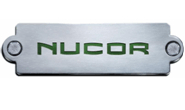Market Segment

February 4, 2021
Nucor’s Topalian: It’s About Capability, Not Capacity
Written by Tim Triplett
Nucor is investing to grow in capability not capacity, said Nucor President and CEO Leon Topalian in remarks Tuesday during the virtual Tampa Steel Conference, co-hosted by Steel Market Update. “It’s not about tons and volume, but about servicing customers’ long-term needs,” he said.
One growing customer segment for Nucor is the auto industry. Nucor claims to be the first electric arc furnace (EAF) minimill with the capability to produce Gen 3 advanced high-strength steels for demanding automotive applications.
With HRC prices soaring, currently pegged by SMU at a record-high $1,150 per ton, steel buyers are calling for mills like Nucor to add more capacity and relieve the tight supplies. Topalian said Nucor is investing to provide a wider range of products and a differentiated value proposition, not necessarily additional capacity. Nucor’s recent investments include a new rebar mill in Frostproof, Fla., expansion of its Gallatin sheet mill in Ghent, Ky., a new plate mill in Brandenburg, Ky., and a new galvanizing line at Nucor Hickman in Arkansas.
Topalian noted that the ultimate driver of the steel prices is supply and demand. Nearly 30 million tons of capacity were removed from the marketplace, largely due to the pandemic, and only about 15 million tons have been brought back so far. With an additional 6-7 million tons in the works through new projects and expansions, and demand robust, the Nucor CEO said he believes the domestic market will remain in a net deficit for some time. With Nucor’s backlogs near historic highs, he said, prospects for the steelmaker are positive
Topalian acknowledged there could be a squeeze in scrap availability as new EAF mills come online over time. Nucor has positioned itself to control its iron units internally, he noted, pointing to the company’s DRI facilities in Louisiana and Trinidad. The potential addition of Canadian and U.S. merchant pig iron units from Stelco, Cleveland-Cliffs and/or U.S. Steel could have a positive impact on the market if domestic production is competitively priced, he said.
When asked about Section 232 tariffs, the impact of the Biden administration’s “Buy American” rules, a potential infrastructure bill and reshoring, Topalian said the government needs to remain vigilant on illegally dumped and subsidized steels coming to the U.S. In his opinion, the tariffs have worked as designed. Despite the effects of the global pandemic, the country wasn’t ravaged by a surge of imports as it was during the oil crisis in 2015 and 2016, when foreign steel represented nearly 30% of domestic consumption. Steel imports had about an 18 percent market share in 2020.
By David Schollaert, David@SteelMarketUpdate.com







